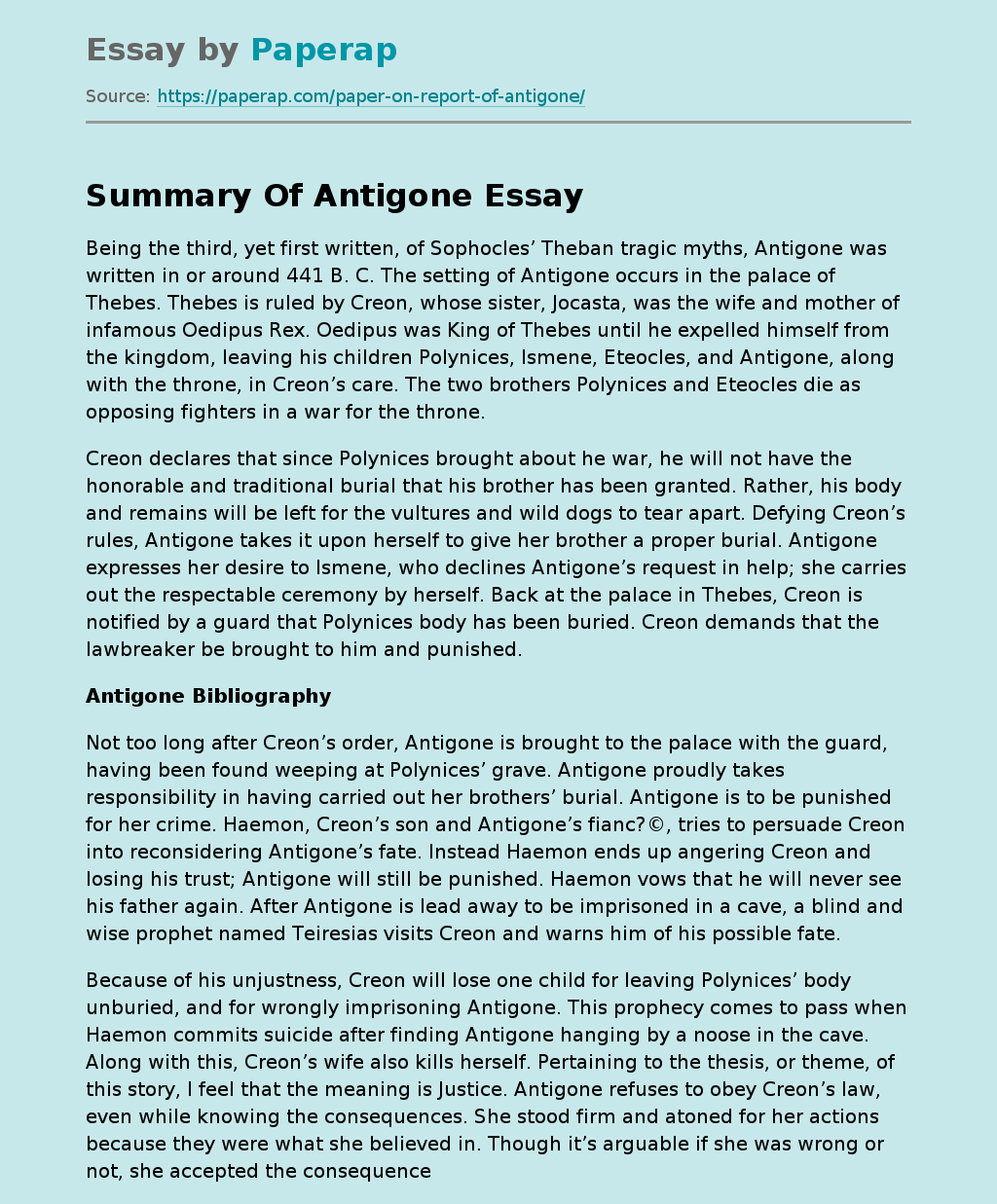Summary Of Antigone
Being the third, yet first written, of Sophocles’ Theban tragic myths, Antigone was written in or around 441 B. C. The setting of Antigone occurs in the palace of Thebes. Thebes is ruled by Creon, whose sister, Jocasta, was the wife and mother of infamous Oedipus Rex. Oedipus was King of Thebes until he expelled himself from the kingdom, leaving his children Polynices, Ismene, Eteocles, and Antigone, along with the throne, in Creon’s care. The two brothers Polynices and Eteocles die as opposing fighters in a war for the throne.
Creon declares that since Polynices brought about he war, he will not have the honorable and traditional burial that his brother has been granted. Rather, his body and remains will be left for the vultures and wild dogs to tear apart. Defying Creon’s rules, Antigone takes it upon herself to give her brother a proper burial. Antigone expresses her desire to Ismene, who declines Antigone’s request in help; she carries out the respectable ceremony by herself.
Back at the palace in Thebes, Creon is notified by a guard that Polynices body has been buried. Creon demands that the lawbreaker be brought to him and punished.
Antigone Bibliography
Not too long after Creon’s order, Antigone is brought to the palace with the guard, having been found weeping at Polynices’ grave. Antigone proudly takes responsibility in having carried out her brothers’ burial. Antigone is to be punished for her crime. Haemon, Creon’s son and Antigone’s fianc?©, tries to persuade Creon into reconsidering Antigone’s fate.
Instead Haemon ends up angering Creon and losing his trust; Antigone will still be punished. Haemon vows that he will never see his father again. After Antigone is lead away to be imprisoned in a cave, a blind and wise prophet named Teiresias visits Creon and warns him of his possible fate.
Because of his unjustness, Creon will lose one child for leaving Polynices’ body unburied, and for wrongly imprisoning Antigone. This prophecy comes to pass when Haemon commits suicide after finding Antigone hanging by a noose in the cave. Along with this, Creon’s wife also kills herself. Pertaining to the thesis, or theme, of this story, I feel that the meaning is Justice. Antigone refuses to obey Creon’s law, even while knowing the consequences. She stood firm and atoned for her actions because they were what she believed in. Though it’s arguable if she was wrong or not, she accepted the consequences in full.
When being trialed by Creon, Antigone states this: “And what law of heaven have I transgressed? Why, hapless one, should I look to the gods any more, – what ally should I invoke, – when by pity I have earned the name of impious? Nay, then, if these things are pleasing to the gods, when I have suffered my doom, I shall come to know my sin; but if the sin is with my Judges, I could wish them no fuller measure of evil than they, on their part, made wrongfully to me. ” From this I interpreted that she had seen no wrong in her doings. Creon’s law isn’t what she believed to be that of the righteous god’s and that their Judgment is what atters most.
Since the beginning of the book, it was questioned whether Creon’s declaration the kingdom for the throne, but another thing to consider is whether everyone, including Polynices, is entitled to be properly taken care of after death. “But I cherish good hope that my coming will be welcome to my father, and pleasant to thee, my mother, and welcome, brother, to thee; for, when ye died, with mine own hands I washed and dressed you, and prepared drink-offerings at your graves; and now, Polynices, tis for tending thy corpse that I win such recompense as this.
Not only were Antigone’s defiance in burying her brother unheard of, but so was the fact that she was a rebelling woman. Women were expected to obey and have little to no rights. To be so disobedient and free willed may have been threatening to Creon and his position in authority. Similar acts of rebellion and courageous women can be seen in history. Women such as Susan B. Anthony, who supported the right for women to vote, have similar attributes to Antigone. Susan believed that all women were equal to men, and she knew the Justice in that being true. Along with Susan B.
Anthony is a woman named Rosa Parks, who saw that it was unjust for African American’s to be unlawfully required to sit at the back of the bus, while white- skinned people were not. Rosa addressed this problem by sitting at the front of the bus and refusing to move when asked. Throughout the whole story, Antigone is keen on doing what is Just. In the end, when Antigone has accepted her fate, she declares: “It seems fair to me to die doing it… ‘ must please those below a longer time than people here, for there I shall lie there forever” Bibliography Antigone; Sophocles- Prestwick House, Inc. ; 2005 edition (December 1 , 2005) Page 40
Summary Of Antigone. (2019, Dec 05). Retrieved from https://paperap.com/paper-on-report-of-antigone/

